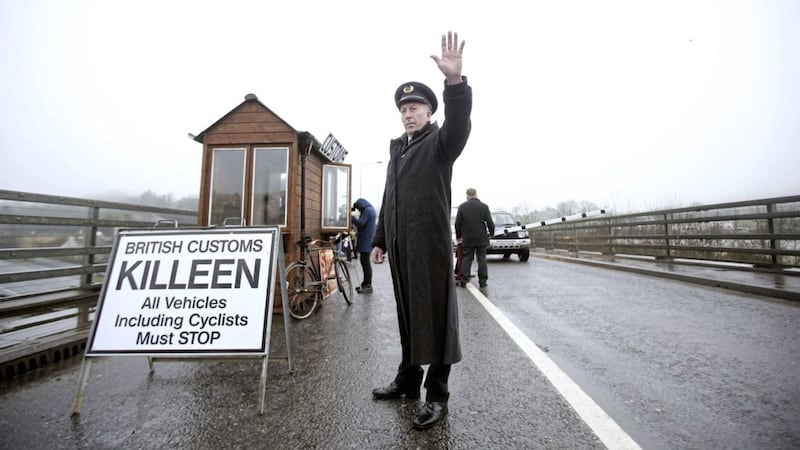The first details have emerged of post-Brexit customs requirements. Despite some excitable reporting, the real news is how little is involved.
Ireland’s Revenue Commissioner has told the Oireachtas that between 6 and 8 per cent of goods vehicles must be inspected, but mostly for paperwork, which would be electronic and almost always pre-approved.
Only a “small number” of physical inspections would be needed, while the only fixed infrastructure would be “facilitation posts” 10 to 15 kilometres from the frontier.
In other words, for the vast majority of vehicles, clearing customs would just mean one more beep from the dashboard while whizzing through the Drogheda toll booth.
The UK might want to do something in the opposite direction, perhaps closer to Stranraer than Banbridge. However, the Irish plans alone would meet EU rules for a hard border. As there has never been any question of restricting free movement of people, this would appear to be Brexit’s worst-case scenario.
**
So farewell then to Barra McGrory, often crassly described as the first Catholic director of public prosecutions.
His actual significance was to be the first director appointed under the devolution of justice. McGrory has been forced to deny assumptions he is leaving due to legacy issues, which led to him being criticised by unionists and Conservative MPs.
His successor will now face the same basic problem - prosecution itself is inevitably political. Even a perfect “balance” of legacy cases, as promised in the Conservative manifesto, is a subjective, political goal. Dealing with the past might highlight that but dealing with all crime under finite resources is no less an act of policy.
Yet because of how justice was devolved, the Public Prosecution Service must pretend to be so perfect and objective that it cannot really explain itself. Hence its decisions end up being ascribed to the religion of its director.
**
Question are mounting over the DUP’s Brexit campaign funding - questions the Electoral Commission points out it is legally constrained from answering.
We can only wait to see if the commission takes some action against the DUP, by fining it or forcing it to return the money.
Other parties are making great play out of this but it all looks two-faced while they refuse to call for an end to donor secrecy, which is maintained - supposedly at their insistence - by the secretary of state. The DUP might be beyond embarrassment but if everyone else called for transparency it would highlight any dubious foot-dragging at the Northern Ireland Office, which would embarrass the British government, now that Brexit has made our unique donor secrecy a UK-wide issue. So why is this call not being made?
**
Belfast’s Dublin Road cinema is to be replaced with a swanky new office block after Belfast City Council approved the plans.
Although audiences at the multiplex had clearly been declining, it was at the heart of the city’s night life for years and planners felt the need to request a continued cultural dimension.
Consultants for the project have promised “a focal public open space with potential for an outdoor cinema and public art exhibitions”. This unfortunately recalls how Belfast City Council approved the Victoria Square shopping centre after developers promised to build a public library.
That quickly turned into a promised bookshop, then vague talk of sculpture. In the end, Victoria Square cited its “cultural dimension” as its multiplex cinema.
**
Gavin Boyd, chief executive of the Education Authority and thus the official in charge of all Northern Ireland’s schools, has written to the teaching unions warning them that strikes are “seriously affecting the education of children and young people.”
The comrades have reacted furiously, with the Ulster Teacher’s Union calling Mr Boyd’s letter “insensitive” and the NASUWT branding it “fake news” - and they have a point. Occasional strikes cannot do any more harm to pupils than occasional training days, or indeed elections.
The real disruption is caused to working parents, which is why teachers strikes do not work - they generate public antagonism rather than sympathy, thus putting no pressure on politicians. Last year, the Irish government felt sufficiently confident to face down a teacher’s strike on this basis - and to say so.
**
DUP Westminster candidate David Simpson has been ridiculed over an election leaflet that says he visited Afghanistan, after it emerged the 2010 trip was cancelled because the Ministry of Defence could not find a flak jacket to fit him.
Particular scorn has been directed at DUP claims this was a printing error.
The leaflet’s phrase “has visited troops on the front line in Afghanistan” is not the sort of thing that might be accidentally typed out in its entirety.
However, Simpson did visit front-line troops in Iraq in 2008, the leaflet appears to show a picture of this, and typing ‘Afghanistan’ instead of ‘Iraq’ is all too imaginable a mistake.
The real problem for Simpson is that his UUP election rival in Upper Bann, Doug Beattie, is a decorated veteran of Iraq and Afghanistan - and he is publicly finding this all most amusing.
newton@irishnews.com









